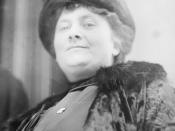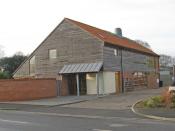Mandie McCracken
Developmental Theory paper- Montessori
Montessori Schools
Montessori never believed, that all civilization corrupted the child. On the contrary, she believed that work, the systematic mastery of the environment, met an innate need of the developing human being from the earliest age and was the key to both individual development and the progress of civilization. She had no desire to turn the young child out of school into the world of nature; what she wanted was to make use of nature to perfect the school, making it a place that met the real need of children.
Maria Montessori was the first female physician in Italy, an amazing accomplishment at the turn of the twentieth century. However, becoming a medical doctor was only the first step in her long successful career. She began her professional research involving children with observations of mentally retarded children, and was greatly influenced by the work of Itard and Seguin.
In 1901 she seemed to be at the high point of her medical career, yet she felt a need for further study and re-enrolled in the University of Rome to study philosophy, psychology, and anthropology. In 1906 she was 36 years of age, an educator, writer, lecturer and medical doctor. She started a school for underprivileged children in the San Lorenzo district of Rome. Since funding allowed only office style furnishings, she contracted a carpenter to make smaller, child-sized furniture and equipment of her own design. She began this trial school with 60 deprived children under the age of six. As she worked, she observed and modified, modified and observed. Within six months, her results were phenomenal. She began attracting countrywide attention. The children displayed self-discipline, preferred learning materials to toys, and worked with a profound concentration and joy. They had a love for order,


